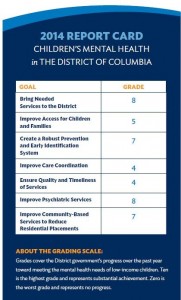Report card season is just around the corner — a time for parents to reflect on where their kids are doing well and where they need extra effort for a more successful year ahead.
To ensure that all DC children can make progress, Children’s Law Center issues another kind of report card in the spring: one that grades the District government on how it is meeting the mental health needs of DC’s most vulnerable children.
It’s not a coincidence that we link mental health to educational outcomes. Failing to help children with poor mental health places them at greater risk of dropping out of school, ending up in prison or worse. In fact, about half of students ages 14 and older with a mental illness drop out of school. Ensuring timely mental health services is especially critical for the District’s poorest children who are more likely to experience the trauma of violence, homelessness and family instability than other children.
In the 2014 Children’s Mental Health Report Card, we give the District mixed grades for uneven progress that is failing to reach too many children who have mental health concerns. The good news is that the District gets high scores for important reforms that are poised to get many more children the screening, assessment and treatment they need. However, the District gets poor grades for missing more than 5,000 low-income children that research suggests need mental health services but are not being treated. It also ranks DC low for its inability to provide quality and timely services, citing evaluations that show long delays in connecting children to care.
With the DC Council poised to pass the District’s FY 2015 budget in June, here are three things District leaders can do to make more progress in meeting our children’s mental health needs:
- Expand the Early Childhood Mental Health Consultation Project. Early identification of mental health concerns leads to earlier treatment and more positive outcomes for children. That’s why we support the District’s Early Childhood Mental Health Consultation Project, which places mental health clinicians within child care centers to screen young children for any concerns. Currently, fewer than 5 percent of the District’s child care providers have access to this excellent project. Funding should be increased.
- Designate funds for the Behavioral Health Access Project. Pediatricians are well positioned to identify when a child has a mental health issue. A new project launched by the DC Collaborative for Mental Health in Pediatric Care will link mental health specialists to pediatricians, leading to better treatment for children with mental health needs. The good news is that the Department of Behavioral Health verbally committed $500,000 to this project during recent budget hearings. To ensure its funding, the DC Council should designate a specific line item for this program.
- Expand school-based mental health programs. School can be one of the only constants in a child’s life, making it an effective place to provide mental health services. However, only one out of four public schools currently has a school-based mental health program, and the FY 2015 Department of Behavioral Health budget request does not include funds to expand the program. Funding should be increased.
The District should invest in these programs to allow more children with mental health needs to learn in school, live with their families and thrive within their communities. Without greater commitment to children’s mental health, we not only jeopardize their future but also risk stalling important progress that has been made in the District’s schools and child welfare system, affecting thousands more children.
To print a copy of today’s blog, click here.

